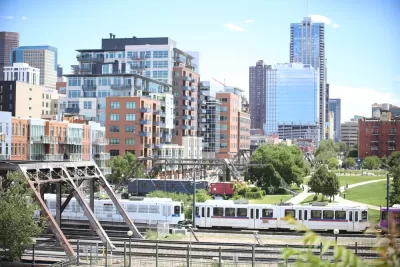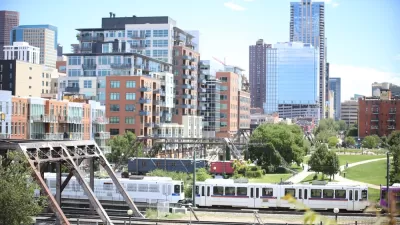The Denver City Council recently adopted the “Expanding Housing Affordability” policy.

The Denver City Council earlier this month approved a mandatory inclusionary zoning ordinance that requires developers to include income-restricted housing for all developments of more than ten total units.
The city needs more than 50,000 units of affordable housing to address its housing shortage, according to the Denver Housing Authority.
“The Expanding Housing Affordability policy will mandate that developers building multifamily projects with ten or more units create income-restricted housing for households making between 60% and 90% of the area median income — currently, between $56,592 and $84,888 for a family of three,” reports Kyle Harris for Denverite. “Those projects will be required to maintain between 8% and 15% of the units as income-restricted for 99 years. Those percentages will be slightly higher in downtown, Cherry Creek, and other high-cost parts of the city.”
Developers can also pay a fee to avoid the affordable housing requirement, according to Harris. The city has been working on the Expanding Housing Affordability policy since 2020, but a state law approved in 2021 enabled the City Council’s approval of the new law.
More news coverage and insight into the debate about Denver’s new mandatory inclusionary zoning policy ca be found in a separate article in the Denver Post.
FULL STORY: City Council mandates developers help solve Denver’s housing crisis — even if some don’t want to

Planetizen Federal Action Tracker
A weekly monitor of how Trump’s orders and actions are impacting planners and planning in America.

Chicago’s Ghost Rails
Just beneath the surface of the modern city lie the remnants of its expansive early 20th-century streetcar system.

San Antonio and Austin are Fusing Into one Massive Megaregion
The region spanning the two central Texas cities is growing fast, posing challenges for local infrastructure and water supplies.

Since Zion's Shuttles Went Electric “The Smog is Gone”
Visitors to Zion National Park can enjoy the canyon via the nation’s first fully electric park shuttle system.

Trump Distributing DOT Safety Funds at 1/10 Rate of Biden
Funds for Safe Streets and other transportation safety and equity programs are being held up by administrative reviews and conflicts with the Trump administration’s priorities.

German Cities Subsidize Taxis for Women Amid Wave of Violence
Free or low-cost taxi rides can help women navigate cities more safely, but critics say the programs don't address the root causes of violence against women.
Urban Design for Planners 1: Software Tools
This six-course series explores essential urban design concepts using open source software and equips planners with the tools they need to participate fully in the urban design process.
Planning for Universal Design
Learn the tools for implementing Universal Design in planning regulations.
planning NEXT
Appalachian Highlands Housing Partners
Mpact (founded as Rail~Volution)
City of Camden Redevelopment Agency
City of Astoria
City of Portland
City of Laramie





























